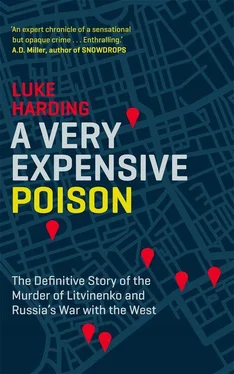Inevitably, Sudoplatov was himself arrested after Stalin’s death. He spent fifteen years in jail before being released in 1968. At first, he had no doubts about the morality of killing Trotskyites and fascists – his country’s enemies. Later, he regretted the way in which communism chewed up so many innocents, including those who fought bravely against the Nazis.
In Sudoplatov’s view, Stalin and Beria were tragic and criminal figures – but also visionaries who played a constructive role in transforming the Soviet Union from a backward peasant state into an atomic superpower. ‘Victorious Russian rulers always combined the qualities of statesmen and criminals,’ the general observed.
Like Service, Sudoplatov believed the truth of any conspiracy would eventually emerge: ‘History shows that no top-secret decisions, no secret crimes or terrorist plans can be concealed forever. This is one of the great lessons of the breakdown of the Soviet Union and Communist party rule. Once the dam is broken, the flood of secret information is uncontrollable.’
13
Leviathan
Bolshoi Moskvoretsky Bridge, Moscow, 27 February 2015
‘He is a totally amoral human being. Totally amoral. He is a Leviathan’
BORIS NEMTSOV ON VLADIMIR PUTIN, FEBRUARY 2015
Boris Nemtsov was in good spirits. It was February 2015 and Nemtsov – once Russia’s deputy prime minister but for many years at odds with official power – was due to lead an anti-government rally. True, the authorities had banished the protesters to Marino, a gritty suburb of Soviet high-rises in Moscow’s distant south-east. And true, Russia’s opposition was, generally speaking, in poor shape.
A few years earlier it was just about possible to fantasise that street power might drive Putin from office. His announcement that he was ‘returning’ to the presidency – after four years as prime minister – triggered the biggest demonstrations since the end of the Soviet Union. But the euphoric rebel mood of 2011–12 was gone. People had been arrested and given lengthy jail terms; Putin had enacted the worst human-rights crackdown for decades; human-rights groups were being forced to register themselves as ‘foreign agents’.
The Putin era looked interminable. Brezhnev did eighteen years as general secretary of the Communist Party, his rule associated with stagnation. Putin – on fifteen – seemed poised to overtake him. In 2017 Putin would likely stand again as president. Another seven years would take him to 2024.
And then there was the war in Ukraine. In the wake of Crimea’s annexation, the president’s ratings had skyrocketed. Many former liberals had embraced the new patriotism, cut dead their western acquaintances, and adopted the slogan Krym Nash – Crimea is ours! One morning a Dutch reporter in Moscow – married to a Russian woman and with a small child – found the words ‘Nato out’ written on his postbox in the stairwell of their communal apartment building. Nationalism – sullen and defiant – was everywhere.
Against this backdrop, Nemtsov knew that the numbers for the rally would be relatively modest. Even if the turnout were huge, the protest wouldn’t feature on night-time TV. Nemtsov hadn’t appeared on federal channels for eight years. The Kremlin had slowly strangled Russia’s opposition, denying it finance, airtime and the ability to take part in elections. Those indomitable souls who kept going weren’t activists but this century’s dissidents, in the tradition of Sakharov and Bukovsky.
Since 2000, Russia had gone from a semi-democracy into something approaching a dictatorship. So why bother? Well, for one thing Nemtsov believed in democratic methods, even though democracy in Russia had practically disappeared. For another, there was Putin’s covert invasion of Ukraine. According to Putin, Russian forces played no role in the conflict. The lie was so blatant, so ridiculous and so easily disprovable, it gifted fresh impetus to Russia’s liberal intelligentsia, lifting them out of their low morale and disarray.
It was a Friday, 27 February. The march – dubbed ‘Spring’ – was due to take place on Sunday, 1 March. Nemtsov was sitting in the studio of Echo of Moscow, the independent radio station. Many opposition media outlets had closed since Putin resumed the presidency in 2012, for the third time. Somehow Echo of Moscow survived. Nemtsov was a frequent guest here. He was dressed casually, as always, in jeans and a turquoise jumper. Nemtsov was an alluring figure – fifty-five years old, good-looking, charismatic.
During his early political career, he had enjoyed high office. He came to prominence in the 1990s as the governor of Nizhny Novgorod. A reformist, a liberal and a supporter of Boris Yeltsin, he rose in 1997–8 to become deputy prime minister. He was talented and genuinely popular, with more than a sprinkling of stardust. Was he, as some thought, even a future president?
In fact, the new millennium belonged to Putin, an obscure and charmless KGB agent. Nemtsov started his own liberal party, the Union of Right Forces, which in the early stages of Putin’s presidency was electorally competitive. Slowly, however, he was squeezed out – from the Duma, from TV, from public space. He carried on anyway – co-founding another democratic party, Solidarity, in 2008, and standing to be mayor of Sochi, his home town, the following year.
I first met Nemtsov in 2009, on the campaign trail. We sat together in a rusty yellow minivan as it rattled up Sochi’s steep hills. Nemtsov was bitterly critical of the forthcoming Sochi Olympics, a project mired in corruption and ‘banditism’. He visited sanatoria and held meetings with local Sochi workers. He was a charming and persuasive candidate.
Terrified that their apparatchik candidate might lose, the local Sochi authorities banned Nemtsov from appearing on TV and in local newspapers. He faced dirty tricks and a pro-Kremlin activist chucked ammonia in his face. The Kremlin candidate won. Undeterred, in 2011 Nemtsov co-founded the Popular Freedom party – together with Mikhail Kasyanov, the former PM. Election officials refused to register it.
Even now, Nemtsov had not lost hope. During the interview with Echo of Moscow, Nemtsov came across as honest and cogent. He rubbished the Kremlin’s mismanagement of Russia’s economy and its ‘dead-end domestic politics’. The current model, of giant state corporations run by incompetent bureaucrats, had failed, he said. Much of Russia was in a state of crumbling decay. He wanted an improved deal for the provinces, an end to rigged elections, better healthcare.
But his main preoccupation was Putin’s Big Lie. Nemtsov had always seen his role as educational. He would explain to voters, argue with them, debate. At a time of blanket state propaganda this mission – you could call it enlightenment – was more important than ever.
The interview lasted an hour. Nemtsov told the station’s listeners that he had ‘documentary proof’ that undercover Russian soldiers were fighting and dying in eastern Ukraine. This was borne out by a steady flow of zinc coffins returning in the dead of night from the war zone in Donetsk and Luhansk – back to Russian cities like Pskov, Kostroma and Nizhny Novgorod, where Nemtsov was once governor. Putin wasn’t just a liar – he was a specialist in lying, Nemtsov said. A ‘pathological liar’, in fact.
The interview went well. Nemtsov was optimistic that a well-attended march for peace might have a sobering effect on the Kremlin, and challenge the prevalent mood of ugly nationalism. That evening he had a late dinner with his girlfriend, Anna Duritskaya. She was Ukrainian and he’d collected her from the airport that morning. They ate at a café in GUM, the State Department Store, famous in Soviet times and now a capitalist shopping mall with worn marble stairs and ornate balconies off Red Square. Fairy lights outlined the nineteenth-century building. The café, Bosco, looked out onto Lenin’s tomb.
Читать дальше












